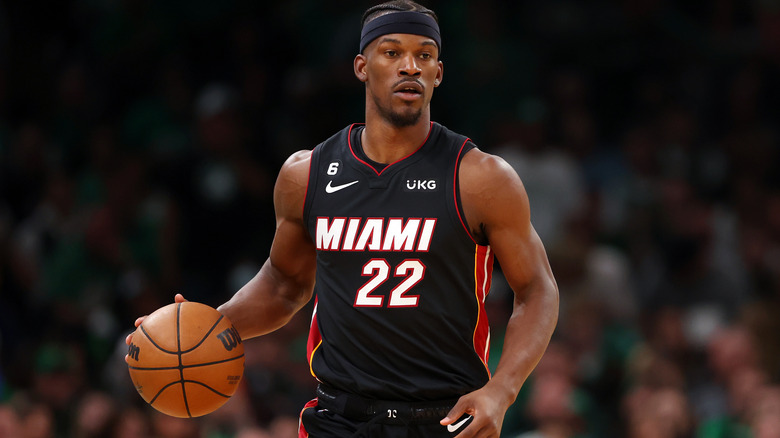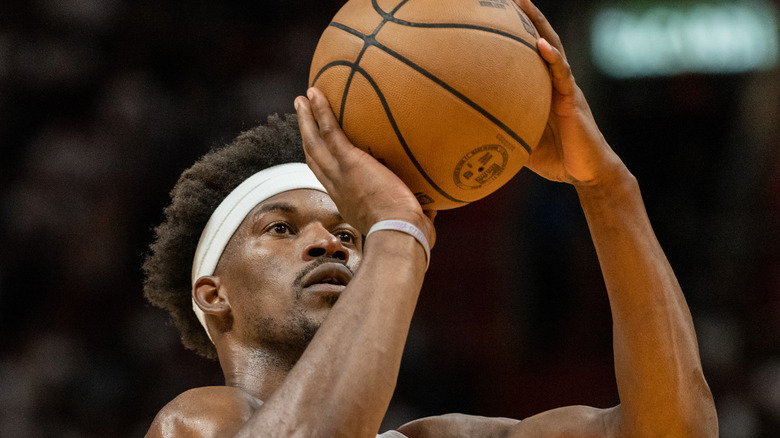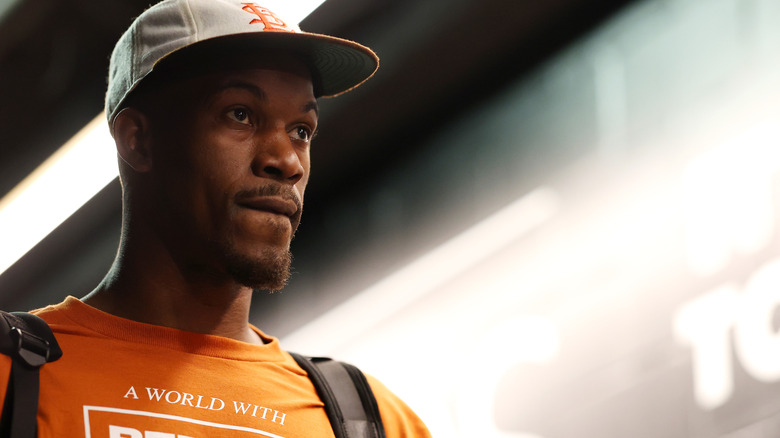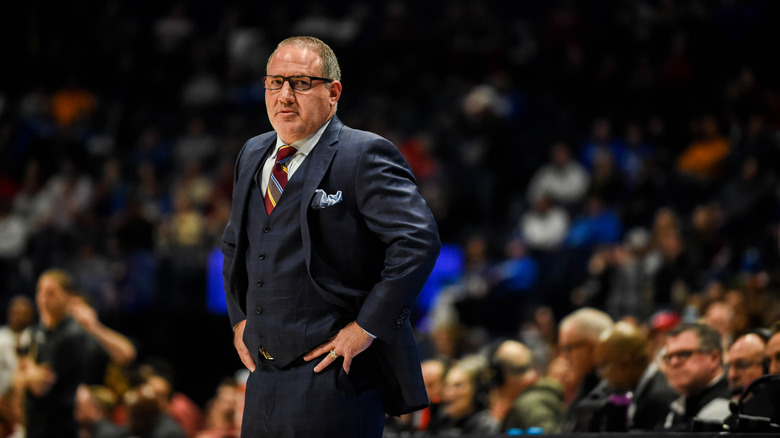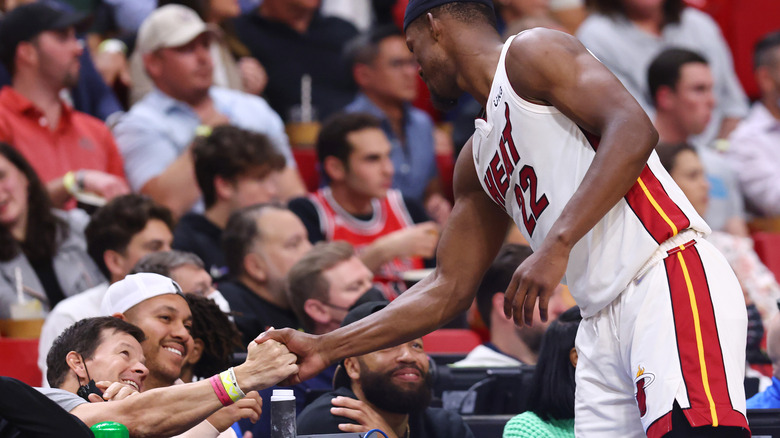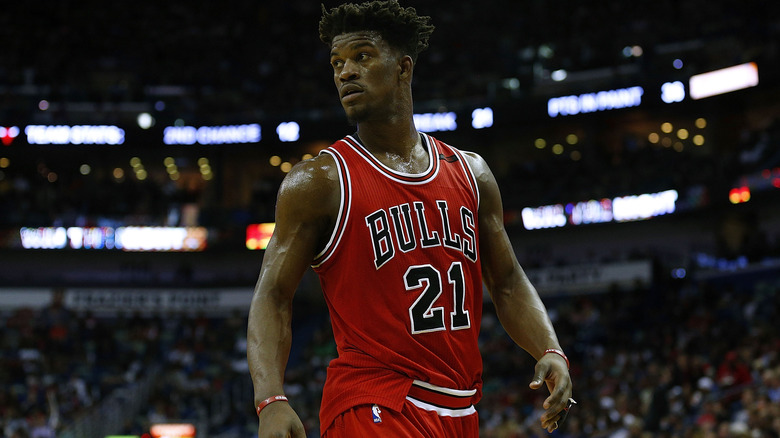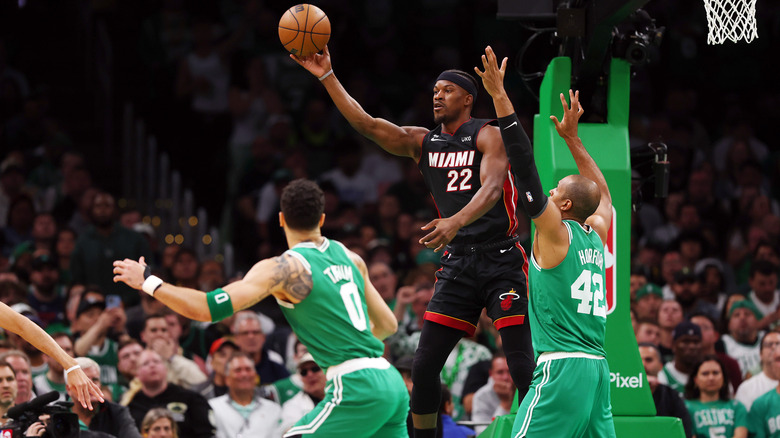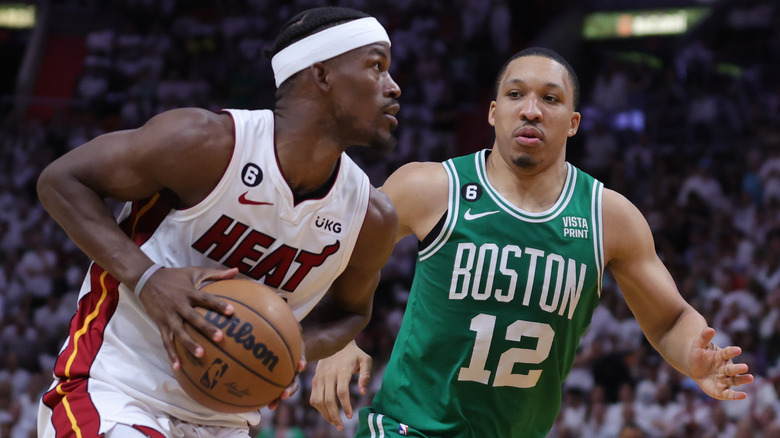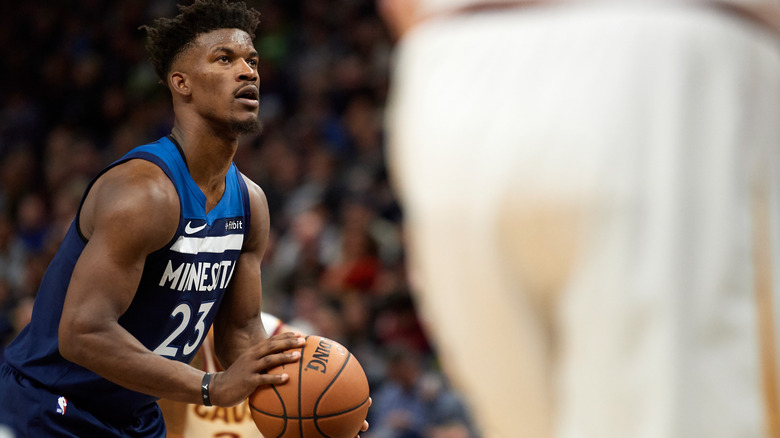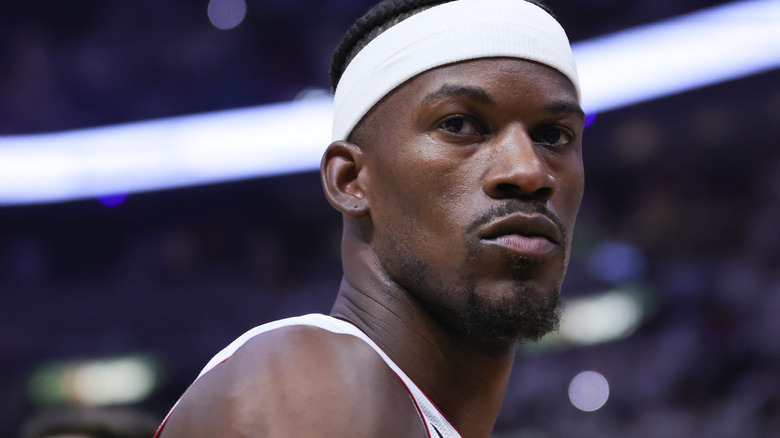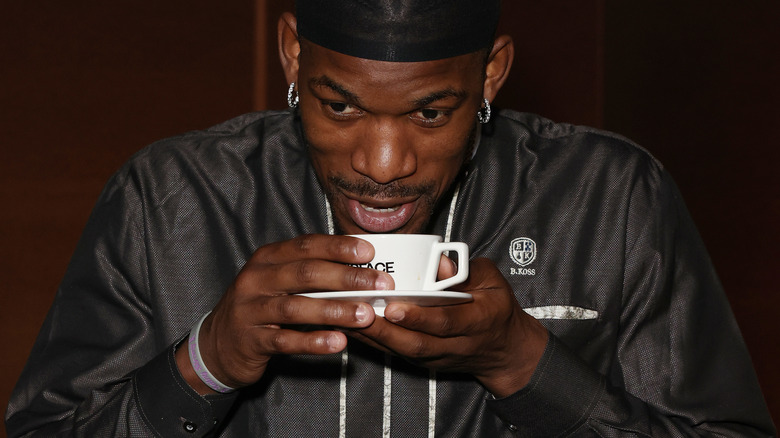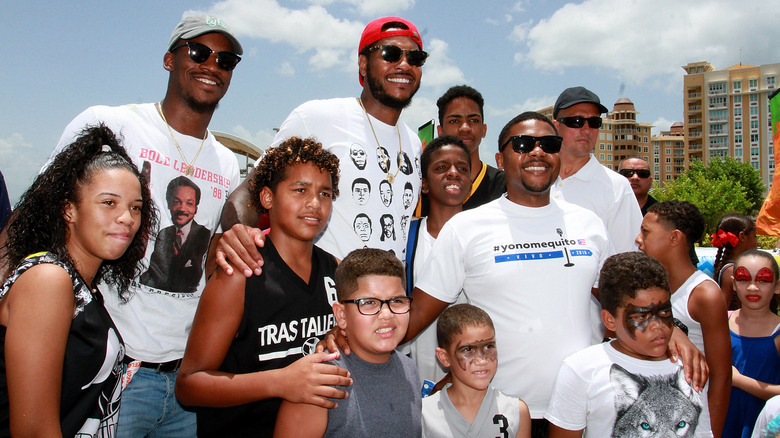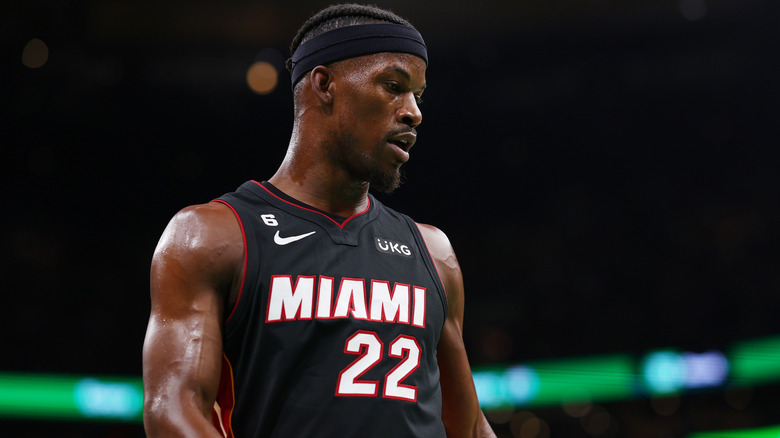The Untold Truth Of Jimmy Butler
When the Miami Heat made their run for the Finals in 2023, there had been a point in the recent past where the team could have chalked the rest of the season up to a learning experience. But that's not what happened, and they name-dropped Jimmy Butler as being the gravitational force that solidified the team into something to be reckoned with.
It's possible to even go a step further and point out that the almost fictional-sounding, claw-their-way-to-the-top season of the Miami Heat was reminiscent of Butler's own journey. Early on, no one saw him as the breakout star that he would become, and in fact, he initially had exactly zero colleges knocking on his door hoping to recruit him. It was only after spending a year playing for a junior college that he got any attention at all, and once he made it to the NBA, it wasn't exactly smooth sailing.
He was picked up at the tail end of the first-round draft, bounced from team to team, and made headlines for clashes with coaches and players. When he landed with the Heat, though, things seemed to mesh for everyone involved. And all those headlines? The lesser-known stories are just as fascinating.
He hates that story about his childhood
Jimmy Butler's unconventional path to stardom has been told over and over again, and it's heartbreaking stuff. There's the absentee father, the mother who kicked him out when he was just 13 years old, and it wasn't until high school that he found a more permanent family.
The story's been told, sure, but here's the thing: When the Bleacher Report spoke to Butler back in 2015, he said he was pretty much over hearing about it. He said it wasn't the sob story everyone seemed determined to make it out to be and took particular issue with the claim that he spent a good part of his teenage years homeless. He clarified: "I was not living under a bridge. That's homeless. Or standing on the corner, asking for change. That's not what it was. I'm not going to say it was the easiest of times, don't get me wrong, but I had a home. Or homes."
Butler did have a roof over his head and spent years bouncing between the homes of friends who'd let him sleep on their couches. And overlooking that is forgetting about the friends who became family, reaching out and taking him in because they wanted to. And that made it not-so-bad, he says: "I had people. I wouldn't change that for the world."
A ringing phone taught Jimmy Butler about team spirit
It doesn't matter how much of a team player someone is ... until, that is, the rest of the team knows it. When Jimmy Butler first headed off to college, he went to Tyler Junior College. It was there that he learned the basics of being the player he was going to grow into, and that included working with teammates toward a common goal. When The New York Times spoke with his Tyler teammate Joseph Fulce and coach Mike Marquis, they had an interesting memory to share. The moment when that group of Tyler ball players became not just a group of students but a team? It didn't happen on the court at all.
Instead, they were sitting in their very first team meeting, when a phone rang. Someone had left their phone turned on while in a locker, and that went against the most basic of team rules. But no one snitched, even when the coach sent them out to run sprints until someone came clean. Butler, in particular, was named as the guy who knew which locker the ringing phone was in but didn't say a word.
To Fulce, it said everything about what kind of friend and teammate Butler was, and Marquis remembered just how important that meeting had been: "I think that rallied them more than any sort of team-building exercise we could have done."
On the lessons that made him great
Sometimes, people come into someone's life just when they're meant to be there, and that's what happened with Jimmy Butler and Buzz Williams. Williams (pictured) was the coach at Marquette when Butler's teammate, Joseph Fulce, was scouted from Tyler. Fulce spoke up on Butler's behalf, and the offer that followed would prove to be a fortuitous one. Not only did it mean that Butler ended up playing college ball, but it also meant he was working with a coach that knew exactly what he needed.
Williams told the Bleacher Report, "There was symmetry between where he was as a player and where I was as a coach. I coached him in a manner that bordered on inhumane, [but] because of his background, he had no plan B, no escape route." At the same time Butler knew Marquette was his make-or-break chance, Williams said he was in the same boat. He, too, was from a small Texas town and saw Marquette as his chance to either make it out, or make an "inevitable return to hauling hay."
And the coaching style Williams described as sounding cruel was what Butler said he needed: "That's why I will love him to death for the rest of my life, because he knew the buttons to press that could get me going. I had to find a way to fit in ... [and] it was never because I was the best player."
He credits Mark Wahlberg with teaching him some life lessons
When does someone know that they've made it? That varies, but it's entirely possible that for Jimmy Butler, one of those "I've made it" moments came when he was with the Chicago Bulls, and Mark Wahlberg wanted to come by and play a little basketball. That's exactly what happened, Butler told Rolling Stone, and the two hit it off. Butler says Wahlberg taught him one of the most important off-court lessons in his career: "He's changing a lot of lives, starting with mine, to tell you the truth. ... He's teaching me no matter how famous you get, no matter how much money you make, to still be who you are."
Butler shared how he had been inspired by the way Wahlberg had stayed close to the friends he'd had growing up, and when he spoke with Complex in 2019, he casually made it clear that he was super stoked to be one of those friends. In addition to having gone on a European vacation together, it was the everyday stuff that he counted as more important: "I feel like I could call, talk, text him about anything," Butler explained.
It's clear he's taking Wahlberg's lessons to heart, too, telling Andscape that while he really doesn't care what most people think of him, he's learned to respect the opinions of those closest to him. If they say he's being a bit too much, he says that he knows they're telling the truth.
The weight-room conversation that kick-started his determination
Over the course of a relatively few short years, Jimmy Butler emerged from near-obscurity to become one of the top players in the NBA. It's easy to forget, then, that out of college, he wasn't on anyone's radar at all. At the time, he was just grateful to have been given the chance to play — until one conversation overhauled his entire attitude.
Butler shared with Andscape how he had been pulled aside and asked if he knew how many people in his position — a 30th-round draft pick — were welcomed back when their first contract was up. When he said he didn't know, the unnamed person suggested he go read up on the stats.
"It was really just out of the blue, so I took it as kind of disrespectful because I was just being a happy-go-lucky kid," he recounted in 2019. "But the way that he said it, it was kind of like, 'You're going to be out of the league soon.' And I was like, man, 'Why are you coming at me like that?'" Butler said that he suddenly found himself confronted with the fact that not many players who were drafted as low as he had been continued on to a long-term career, and said, "I got mad. I took it as disrespect. I work incredibly hard. I know I belong."
These are the people who make Jimmy Butler nervous when they're in the crowd
A-list celebs are photographed in their courtside seats all the time, and it seems like they're there more than at any other sport. Does it make the stars on the court stressed to think that the rich and famous are watching their every move, and rooting for — or against — them? Jimmy Butler says that for him, it doesn't.
He also told Rolling Stone that he regularly sees one of his favorite musicians in the crowd. Taylor Swift, he said, was a Knicks fan and therefore not necessarily cheering for him, but at her concerts, he was definitely cheering for her. Did it make him nervous, though? Absolutely not: It's all in a day's work once the game's on.
Still, even nerves of steel have their breaking point, so is there anyone who can rattle him from the crowd? Yes: "The hardest people to play in front of are my brothers and friends from childhood, because I can never take them seriously," he said. "I know when they're sitting in the stands; it's constant jokes. They're just waiting on me to shoot an air ball or dribble the ball off my foot so they can laugh."
He might have been a musician if not for Garth Brooks
Some people just have way too much talent to be packed into a single person, and it turns out that according to what Jimmy Butler told Rolling Stone, he has another passion: music. Butler says that it wasn't until he was in college that he started really listening to country music and explained that it initially started as a way to annoy everyone else in the locker room. Then, he started to appreciate it: "I just like people being passionate with what they love to do."
Butler added that in addition to fully appreciating the odd chance to belt out a few tunes — and joking about it being his true calling — he used to play guitar regularly. Those days were put behind him, though, when he met Garth Brooks and saw the wear and tear on his hands. "You mean to tell me that my hands are going to look like that for 50 years?" he said. "I've never played since! Like, obviously I was joking, but I was like, 'Man, your hands don't get used to it?'"
So, he made a choice: Saying that he needed a precise sense of touch and nimbleness in his fingers for basketball, the guitar just had to be put aside. Bottom line? Anyone who ever gets curious about Butler's musical abilities can blame Garth Brooks for putting that on the back burner.
What does he really think of that whole Minnesota thing?
Jimmy Butler's falling-out with the Minnesota Timberwolves isn't the sort of thing that needs to be rehashed: His rage during a practice session, his insults lobbed at coaches ... it's up there in the most outlandish stories in sports, but what really happened?
Butler spoke to The Ringer about it and said that a lot of what was reported was downright false — starting with the oft-repeated idea that the trade was something that had only started being talked about the previous day. He stressed that he'd been in talks with the team throughout the summer months, chasing a trade. He explained that he had nothing but respect for coach Tom Thibodeau: "So do you think that I just waited and was like, 'You know what, Thibs? Here's the hammer. Boom. Let me go.' No."
A build-up of tension and stress over the whole situation makes sense; when things aren't dealt with, they're going to boil over. Butler said that it's all about context, and that said, he told Andscape that with the benefit of hindsight, his time in Minnesota hadn't been that bad. "So, I would say that it was a great chapter in my life, like all the other ones that I've had. I still have some pretty good relationships with a lot of people over there. I have no mad things to say about anybody."
What's he really think of Michael Jordan?
It's no secret that there's different levels of conspiracy theories, so let's talk about one of modern basketball's biggest. The oft-repeated theory is that Jimmy Butler is actually the illegitimate child of Michael Jordan. Does it make sense? Is it possible? Since when are conspiracy theories concerned with those sorts of questions?
Butler sat down with Complex in 2019, and there was a lot of talk about sneakers: He'd been working with Adidas and with Jordan, but said that the shoes and his advertising deal with them didn't have anything to do with his actual relationship with Jordan — which was pretty good.
Butler said that when he hangs out with Jordan, "It's like, 'All right, maybe I do belong here for a reason.'" He likened it to another experience: "It was the same thing when I first got into the NBA, and when I first became an All-Star." Meeting Jordan wasn't just like meeting the sport's other big names, though, and he said that it was something else entirely. He'd been at a birthday party for Jordan, and it wasn't just a meet-and-greet, quick handshake, thanks-for-coming. Instead, they sat, they talked, they hit it off, and it had been the stuff he'd dreamed of: "It's just something that you couldn't tell me or many people, that you'd be able to do that in your lifetime."
Coffee, COVID, and when the hustler got hustled
The COVID-19 pandemic was a lot of different things to a lot of different people, and to Jimmy Butler, it was the kick-off of what would become a new business venture. It didn't start that way, though: Initially, he just bought an espresso machine and charged his teammates $20 a cup. He explained to Thrillist: "As I was sitting in my hotel room in the Orlando bubble, all I could think about was how I could hustle these guys out of their cash."
It ended up being another piece of his incredible life falling into place. Butler had always loved coffee — and, more specifically, the social aspect of sitting down with friends — and he learned that he was really into everything coffee involved. He's since opened Big Face coffee, and he's been incredibly hands-on — he's even gone to coffee farms to see harvests. A dream come true? Pretty much: "I get to go to all of these amazing countries and learn about their cultures and what it takes to make the perfect cup of coffee ... and just be grateful and thankful for the individuals that are putting their life's work into a coffee farm."
Still, there's one hustler who hustled him, and that's Goran Dragic. Butler shared that throughout all of COVID, Dragic would come, visit, chat, they'd swap stories ... and somehow, he never paid for a single cup.
Jimmy Butler lives for his charity work
There's no doubt that for many professional athletes, the game is the most important thing. It's what people are cheering for, after all, and the charity work that goes on behind the scenes? For Jimmy Butler, that's what makes it all worth it. When he talked to Rolling Stone back in 2015, he shared one of the most meaningful compliments he'd ever gotten: A parent whose children looked up to him told him they couldn't have picked a better role model if they tried. "That really touches my heart," he said. "It's very humbling."
Most of the charity work Butler focuses on is youth mentorship, and it's a natural fit. He had to work incredibly hard to get where he rose to be, and at the same time, he's a superstar that kids can look up to and imagine themselves as being. In 2017, Butler was recognized for his work with Chicago's Youth Guidance organization, participating in events like a basketball tournament between law enforcement and youth. He told Andscape: "Their desire to change the world is inspiring, and I'm proud to help them achieve any way I can."
Sometimes, that's with some serious cash. In 2015, Butler visited students at the Phoenix STEM Military Academy. There, he challenged one of the school's juniors to make a one-handed 3-point shot for a cool $10,000 donation: The student didn't need the three chances and made it in one.
What about the naysayers?
Jimmy Butler has a bit of a reputation, telling Complex, "I mind my business, But somehow, someway, I still end up being an a****** somewhere, and I'll never figure it out." Take a look on social media, and the careers of anyone and everyone — no matter how famous, good, or award-winning they might be — are relentlessly scrutinized. Comments — oftentimes hurtful — are bandied about without a care in the world from the trolls, and so that begs the question: How does he handle it?
Butler says he doesn't do social media because of the toxicity there, saying that at the end of the day, what goes around, comes around, as the old saying goes. Meanwhile, he says that he knows perfectly well who he is, and he's content with that — especially considering his firm belief in the idea that constantly worrying about what others think does nothing but prevent a person from growing and learning themselves. Bottom line? The naysayers aren't worth it, and worrying about someone's negative opinion of you only hurts you.
"It's the world we live in, man. People don't want people to be happy. I accept it, but that's them. They trying to take joy away from somebody else, doesn't work for me."
